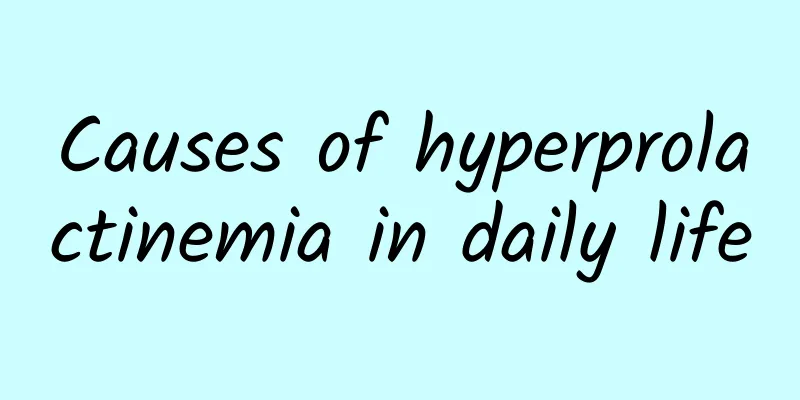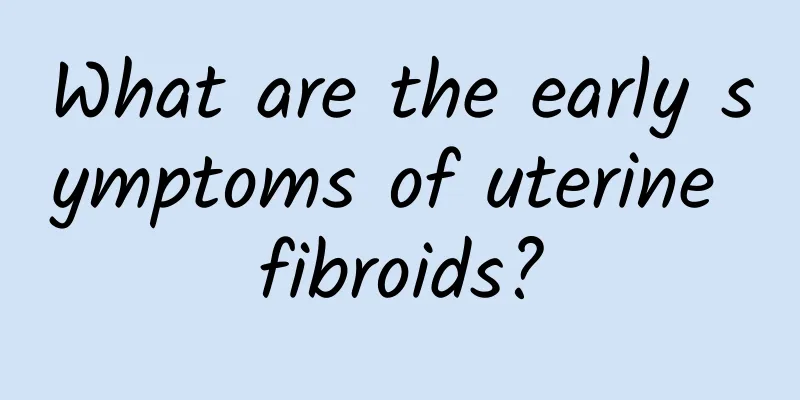What medicine should I take for a uterine fibroid that is more than one centimeter? Can a 1cm uterine fibroid be eliminated by taking medicine?

|
What medicine should I take for a uterine fibroid that is more than one centimeter in size? This is a question that many women with uterine fibroids are concerned about. Although there are many treatments for uterine fibroids, for a uterine fibroid that is one centimeter in size, in addition to surgical treatment, drug treatment is also an optional method. This article will discuss the drug treatment of a one-centimeter uterine fibroid from different angles and whether it can be eliminated through drugs. 1. Choice of drug treatment In order to treat a one-centimeter uterine fibroid, doctors generally choose to use some drugs to control the growth of the fibroid. Common drugs include oral contraceptives, progesterone drugs, and oral resistance drugs. These drugs have different mechanisms of action, but they can effectively slow down the growth of uterine fibroids and relieve related symptoms. 2. Oral contraceptives Oral contraceptives are a commonly used drug for the treatment of uterine fibroids. The estrogen and progesterone contained in the contraceptive can inhibit the growth of the endometrium, thereby controlling the growth of uterine fibroids. Contraceptives can also adjust the hormone levels in women's bodies and relieve symptoms related to uterine fibroids, such as irregular menstruation and pain. 3. Progesterone drugs Progesterone drugs are another commonly used drug for the treatment of uterine fibroids. Progesterone drugs mainly work by inhibiting the growth of the endometrium and reducing the amount of bleeding from uterine fibroids, thereby relieving symptoms and controlling the growth of fibroids. However, progesterone drugs cannot completely eliminate uterine fibroids, but can only temporarily control their growth. 4. Oral resistance drugs For uterine fibroids of one centimeter in size, oral resistance drugs are also an optional treatment. Resistance drugs can block the growth of uterine fibroid cells and induce them to enter a state of apoptosis. However, oral resistance drugs have significant side effects and usually require doctors to closely monitor the patient's condition. From the above introduction, we can see that for uterine fibroids of one centimeter in size, drug treatment is a feasible method. However, drug treatment cannot completely eliminate fibroids, but can only temporarily control their growth. Therefore, if uterine fibroids do not have much impact on life and fertility, doctors may recommend observation and treatment. On the contrary, in cases where fertility and quality of life are affected, surgical treatment may be a better choice. Whether it is drug treatment or surgical treatment, patients need to work closely with doctors. Doctors will develop personalized treatment plans based on the patient's specific situation and regularly review the size of the fibroids and changes in the condition. Only under the guidance of a doctor can patients choose the most suitable treatment method for themselves and achieve effective control of uterine fibroids. For uterine fibroids of one centimeter in size, drug treatment is an optional method. Oral contraceptives, progesterone drugs and oral resistance drugs can be used to control the growth of fibroids and relieve related symptoms. However, drug treatment cannot eliminate uterine fibroids, but can only temporarily control their growth. When choosing a treatment method, patients need to communicate fully with their doctors and make wise decisions based on their own circumstances. At the same time, regular review and professional doctor supervision are also very important. |
>>: What is the cause of uterine fibroids?
Recommend
The most professional hospital for pelvic effusion
Where is the best hospital for the treatment of p...
What are the cure criteria for patients with thick endometrium?
What is the cure standard for endometrial thickne...
Can I still induce labor if I am six months pregnant?
Women can feel fetal movement in the middle and l...
How long does stomach pain last after an abortion?
How long does stomach pain last after an abortion...
There are many ways to control your diet. How much protein should you eat to be considered high in protein?
There are many ways to control diet. Taking low s...
What are the symptoms of intrauterine adhesions?
The symptoms of intrauterine adhesions are mainly...
What medicine should be used for pelvic inflammatory disease and excessive vaginal discharge? It is decided by the doctor
If there are symptoms of pelvic inflammatory dise...
Which hospitals specialize in chocolate cysts?
How to choose the best hospital for chocolate cys...
Understand the causes of gynecological fungal vaginitis
The cause of gynecological mycotic vaginitis is a...
What are the hazards of cervical erosion in women? There are 6 major hazards of cervical erosion in women
Gender experts said that although cervical erosio...
What are the complications caused by uterine fibroids?
What are the complications of uterine fibroids? C...
What are the symptoms of complications of uterine fibroids in women?
Uterine fibroids are a common gynecological disea...
Worry about Clenbuterol! More than 70% of people agree with food history
The storm over ractopamine in American beef conti...
Is fat harmful? Provide energy for the human body
Is fat really all bad and no good? For higher ani...
What causes third degree cervical erosion?
The third degree of cervical erosion actually ref...









